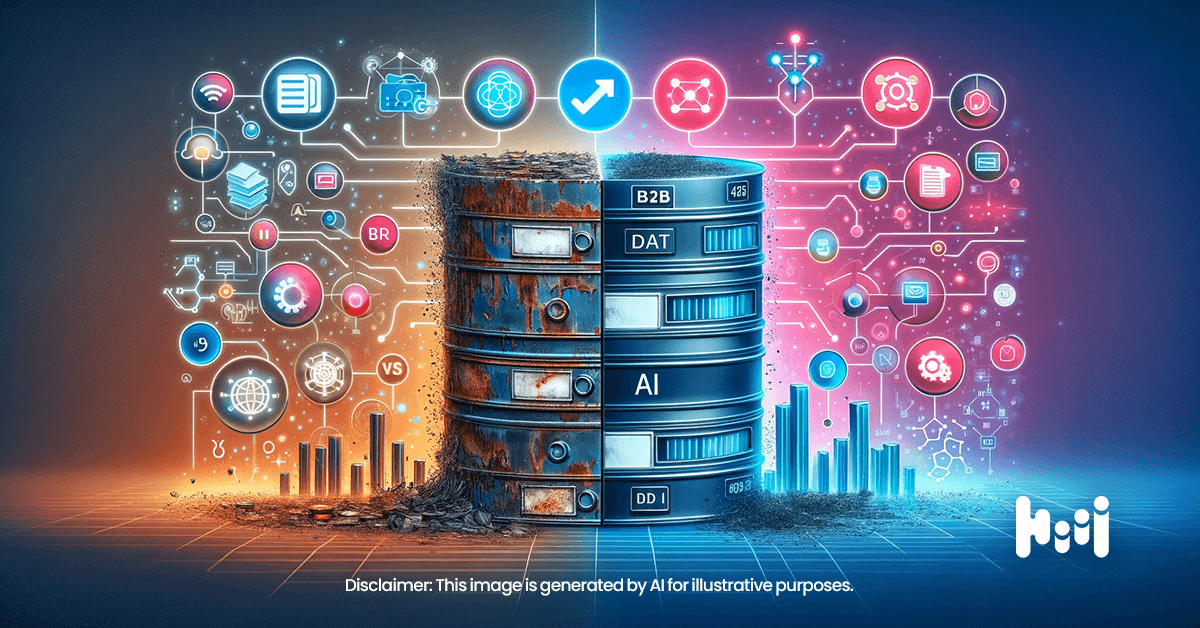Advanced Targeting Techniques in Channel Marketing with Account Intelligence
July 11, 2024

The landscape of B2B marketing has never been more competitive — or complex. Marketing and sales teams now face an environment where buying groups have ballooned to include 6-10 decision-makers who engage in increasingly greater amounts of independent, online research.
Today, your organization’s sales reps only get 5% of a customer’s time during their buying process. That means the vast majority of engagement needs to take place much earlier in the customer journey, across multiple platforms and touchpoints — including channel marketing’s third-party vendors and resellers.
But in order to successfully attract and engage relevant prospects with a high likelihood of actually becoming customers, your channel partners need to target content and messaging carefully. At a time when B2B buyers view personalization as table stakes, it’s crucial for vendors and resellers to leverage data to achieve advanced targeting: identifying, segmenting, and engaging leads with relevant messaging at the right moment.
The need for data-driven ICP targeting
For channel marketers, developing a data-driven ideal customer profile (ICP) is an essential first step in advanced targeting. A shared ICP ensures that both you as the vendor and your channel partners are aligned in your efforts to reach the right prospects, increasing the overall effectiveness of your marketing and sales strategies.
Build an ICP with account intelligence for channel marketing
An ICP is a detailed and specific description of the kinds of companies that are the best possible fit for your product or service. Using a shared ICP helps you and your channel partners agree on which prospects take the highest priority, and what kinds of messages and content will resonate. This alignment helps tech vendors support their partners with more effective and targeted campaigns, and ensures that every marketing effort is directed toward prospects with the highest likelihood of conversion.
However, your ICP shouldn’t be built on gut instinct and opinion. Rather, you’ll want to rely on the gold standard of B2B marketing data: account intelligence.
Account intelligence involves collecting, verifying, and organizing actionable information from multiple reliable sources to create a comprehensive view of your prospects, their organizations, and their online behaviors. Key components of account intelligence include:
- Data enrichment, which enhances your existing data with additional relevant information.
- Demographics about individual prospects, such as age, gender, and job title.
- Firmographic insights about the companies they work for, including size, industry, and location.
- Technographic data about the technologies these companies currently use.
- Intent data about the topics your prospects are interested in, which includes real-time behavioral signals like reading articles, visiting product pages, and downloading content assets.
For channel marketers, leveraging account intelligence to develop a data-driven ICP provides the insights needed for both tech vendors and their partners to prioritize high-value leads and customize outreach effectively.
The benefits of a data-driven ICP
With a data-driven ICP supported by comprehensive account intelligence, channel marketers have a solid foundation to build thoughtful customer segments — and target those segments with personalized campaigns. This approach delivers clear benefits for channel marketers, including:
Increased engagement: Using detailed and accurate data enables tech vendors and their partners to create highly personalized marketing messages that resonate with their target audience, leading to higher engagement rates.
Higher conversion rates: Personalization and relevance significantly improve the chances of conversion. With a clear understanding of the shared ICP and the ability to target them precisely, marketing efforts are more likely to convert leads into customers.
Superior ROI: Aligning marketing campaigns with deep market insights derived from account intelligence drives superior ROI. Every marketing dollar spent is more likely to generate a return when campaigns are precisely targeted and tailored to the needs and behaviors of your ideal customers.
However, leveraging account intelligence and advanced targeting techniques is no small feat. For the best results, channel marketers turn to trusted partners like DemandScience.
Facilitate advanced targeting with the DemandScience data ecosystem
Science’s data ecosystem empowers channel marketers to support their partners with advanced targeting and superior engagement. Here’s a closer look:
AI-driven analytics
Turning data into account intelligence is a complex task that involves collecting and aggregating multiple types of data from disparate sources, often in real time. DemandScience utilizes AI-driven analytics to streamline these processes — making it possible to curate and clean vast amounts of fragmented B2B marketing data. AI tools automate the standardization and error-checking steps that once required time-intensive manual processes.
The result is more accurate account intelligence data that channel marketing teams can use to segment and target their partners’ audience, supporting more personalized campaigns and driving better results.
Extensive network of verified buyers
The DemandScience database includes over 200 million B2B decision-makers worldwide, enriched with relevant and diverse demographic, firmographic, and technographic insights. This network includes buyers with the authority and budget to do business, qualified by ICP and intent, and verified to have a need and a timeframe that fits within your parameters for a great lead.
With this network, channel marketers can help partners identify and reach high-quality leads directly within your shared ICP.
Data partnerships
DemandScience has the industry’s largest proprietary first-party dataset, but our information is supplemented with diverse second and third-party data through strategic partnerships to enhance the breadth and depth of market reach. The infrastructure to ingest and aggregate multiple first and third-party data sources at scale, combined with validation and verification processes, ensures each data record’s accuracy, reliability, and compliance.
By combining various data sources in this way, DemandScience can deliver account intelligence and the ability to provide channel markets with accurate insights to improve targeting precision.
Proprietary intent engine
The multi-factor intent engine at DemandScience analyzes billions of streaming behavior signals from thousands of B2B websites and media publishers to predict optimal engagement times. This intent data is collected and aggregated weekly, showing trends and surges of interest in particular topics. User behaviors such as traffic sources, time on site, volume of content consumed, scroll depth, and types of content consumed are tracked and analyzed at scale. This allows tech vendors and their partners to engage with potential customers at the optimal moment with relevant messages, maximizing the chances of conversion.
Together, this sophisticated data ecosystem allows DemandScience to empower B2B tech vendors and their channel partners to achieve superior targeting and engagement, driving better marketing outcomes and higher ROI.
How to implement advanced targeting techniques
Advanced targeting may sound intimidating, but you don’t need to rebuild your programs from the ground up. Rather, you can start layering account intelligence into your existing channel marketing strategies.
Here are a few examples of how you can use a platform like DemandScience to reach the most relevant audience with the right content at the right time — driving engagement and increasing conversions across your campaigns.
Advanced targeting in content syndication
Content syndication for channel marketing enables you (or your partners) to republish and promote your highest-performing content to a wider audience on third-party industry websites, social media, and online publications. Whether your content syndication campaigns are vendor-led or partner-driven, you can use data to identify and target potential customers within your shared ICP.
With the support of a trusted content syndication partner like DemandScience, you can leverage a global network of verified buyer contacts, enriched with multiple layers of account intelligence, to reach a highly targeted audience with your content. This helps you increase brand awareness and overall reach while focusing on generating high-quality leads within your ICP.
Advanced targeting in account-based marketing (ABM)
Account-based marketing (ABM) campaigns are a proven approach that allows you to focus your marketing efforts on high-value accounts that are most likely to convert. With account intelligence, you can leverage firmographic and technographic data to prioritize accounts and identify relevant contacts — improving penetration and ensuring the buying committee is surrounded with you and your partners’ content and messaging.
For example, you can use DemandScience to enrich data by:
- Confirming your product and your partner’s services integrate with existing systems and teams
- Identifying contract renewal timelines to determine when accounts will be in-market
- Pinpointing crucial members of the buying committee across accounts, including approvers, decision-makers, and influential users
ABM is a resource-heavy strategy, but account intelligence helps optimize your partners’ target account lists and prioritize marketing and sales outreach — increasing the likelihood of conversion and driving ROI.
Advanced targeting in display advertising
Display advertising helps you and your channel partners drive awareness and maintain visibility across the buying journey. DemandScience’s intent engine helps you improve ad engagement by identifying when prospects within your ICP are actively searching for solutions.
For example, you can create co-branded ads featuring both vendor and partner to establish credibility — and target your display ads to high-intent audiences, increasing engagement and maximizing conversion rates by reaching the right audience at the right moment.
These are just a few examples of how account intelligence can power channel marketing activities — but you’ll be hard-pressed to find a B2B marketing strategy that won’t benefit from more accurate and advanced targeting.
Getting started with account intelligence and advanced targeting
If your channel marketing program could use an injection of data-driven account intelligence, our team is here to help. Learn more in our video series on supercharging your channel marketing, or contact one of our account intelligence experts for an in-depth discussion on how DemandScience can transform your channel marketing strategies.

Jason P. Carriere
Sr. Director, Channel Sales










